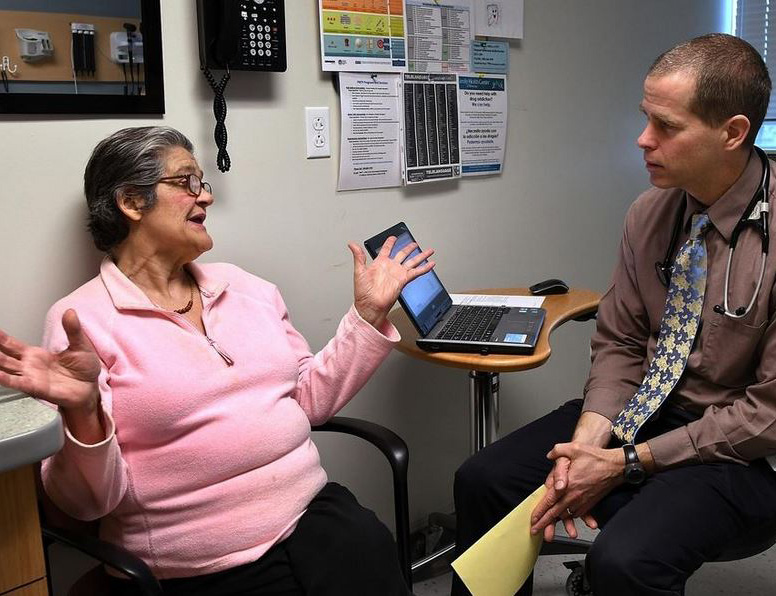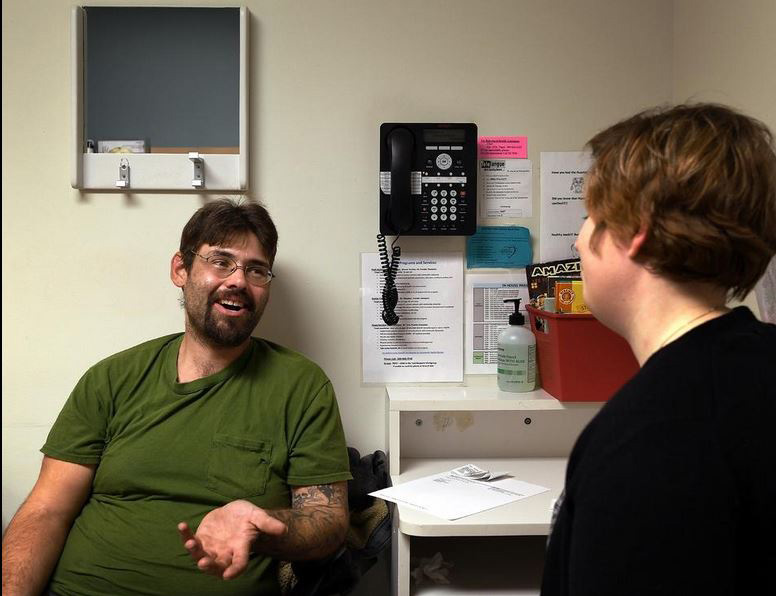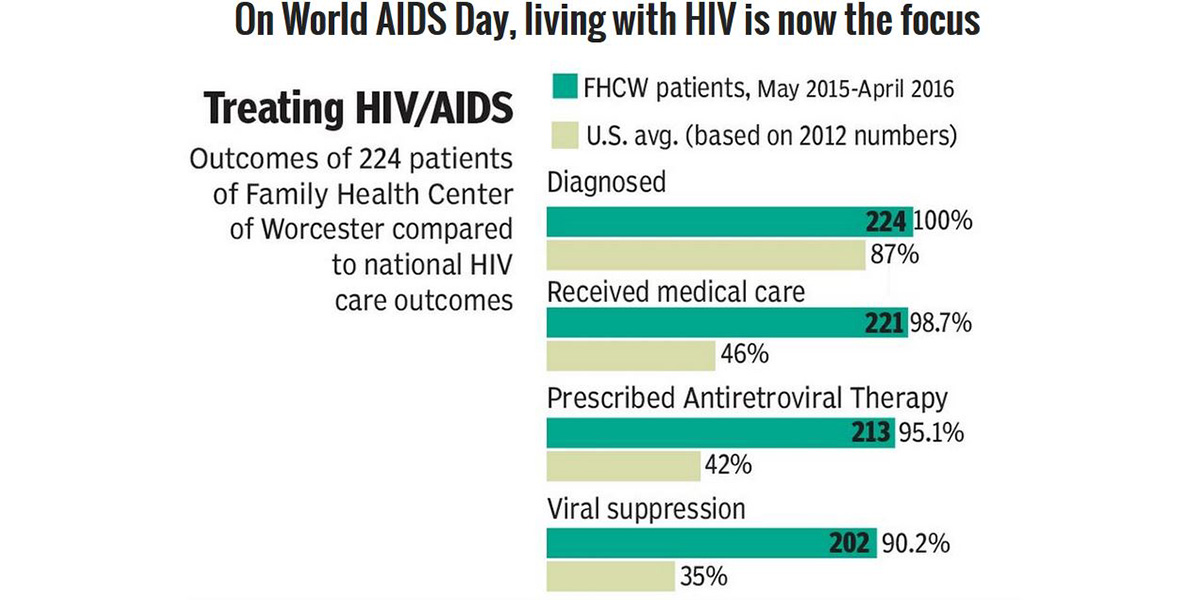

WORCESTER – Laurie D. Wilcox, 64, waited to see her physician at Family Health Center of Worcester on Wednesday and reflected on the date as her five-year anniversary of having undetectable levels of HIV, the virus that causes AIDS by destroying a person’s immune system. It was a milestone after being diagnosed with the virus in 1995.
“At that time it was a death sentence and I needed all the support I could get,” Ms. Wilcox said.
At the time her doctors prescribed 10 to 15 pills, which she took three times a day, she recalled.
Now, she takes a combination of three drugs in one pill to keep her viral load suppressed.
“I know I have to keep taking my pills,” she said. “I live my life but I’m just as healthy as the next person.”
Much has changed in the treatment and prognosis for those infected with HIV over the past three decades. Now health care providers and people with HIV/AIDS face challenges of living and aging with an infection that must still be managed.
Dec. 1 marks World AIDS Day, begun in 1988 to support people living with HIV/AIDS and to commemorate those who have died.
According to the World Health Organization, more than 70 million people worldwide have been infected since the beginning of the epidemic and about 35 million have died. An estimated 36.7 million were living with HIV/AIDS at the end of 2015.
This week the U.S. Centers for Disease Control and Prevention issued a report that raised concern about the potential for new HIV outbreaks as the opioid epidemic grows, noting that one in three intravenous drug users in 2015 reported that they shared a needle within the past year. Approximately 9 percent of HIV infections diagnosed in the U.S. each year are among people who inject drugs.
Instead of juggling dozens of medications and helping patients cope with distressing side effects, health care practitioners who treat HIV/AIDS focus now on keeping patients in treatment and keeping their viral loads under control, not unlike lifelong management of diseases like diabetes.
In Worcester, Family Health Center and the University of Massachusetts Medical School each receive funding through federal Health Resources & Services Administration’s Ryan White HIV/AIDS Program Part C Early Intervention grants, which help pay for care management and outreach to keep patients in treatment.
Family Health Center also administers a grant to the Edward M. Kennedy Health Center in Worcester.
State grants through the Department of Public Health also support prevention, integrated counseling and at UMass a peer-to-peer support program.
It’s a shift in approach that Dr. Philip J. Bolduc, associate medical director for special populations at Family Health Center, described as a model.
Two HIV nurses and an “adherence counselor” keep patients on track with treatment through phone calls, letters and sometimes home visits.
“We enjoy the kind of case management support that I wish we had for other chronic diseases,” he said.
The model seems to be paying off, particularly among populations that are culturally diverse, have low income and face other obstacles to medical care.
Between May 2015 and June 2016, among the 224 patients diagnosed with HIV at Family Health Center, 98.7 percent of patients were retained in care, 95.1 percent were prescribed anti-retroviral therapy or ART, and 90.2 percent were virally suppressed.
Once the viral load is suppressed, people with HIV have roughly the same life expectancy as those without the virus, according to Dr. Bolduc. They also are far less infectious to others, which helps prevent further spread of the disease.
Dr. Jennifer S. Daly, clinical chief of infectious disease and immunology at UMass Memorial Medical Center and a professor at UMass Medical School, said that among the approximately 780 patients with HIV seen at UMass Memorial, 94 percent are on anti-retroviral therapy and 91 percent have a virus level that is undetectable.
The local statistics far surpass national averages. The National HIV/AIDS Surveillance System reported in 2012, 46 percent of those diagnosed were retained in care, 42 percent received anti-retroviral therapy and 35 percent were virally suppressed.
Dr. Bolduc explained that physicians start medications now before the infection progresses to full-blown AIDS, a goal he described as “test and treat.”
He said, “Our target is to have cessation of viral replication so their immune system can recover.”
Another new treatment protocol is pre-exposure prophylaxis, or PrEP, for people at high risk for HIV. Risk factors include being in a sexual relationship with someone with HIV, having sex with someone of unknown HIV status, being an intravenous drug user or commercial sex worker. These people receive treatment with two combined drugs, but need to come in for testing every three months in case they contract the virus and need a different drug therapy.
The comprehensive HIV care model extends to obstetrics. The health center’s family medicine doctors have delivered eight babies since 2014 to women with HIV, with no viral transmission, according to Dr. Bolduc.
Dr. Bolduc and other members of the HIV/AIDS team said that providing care in the community where patients live and offering interpreter services for the 43 different languages spoken at Family Health Center play a big role in helping patients feel comfortable with coming for regular HIV/AIDS treatment.
“Our focus here is bringing excellent HIV care right into the medical home,” he said.
Family Health Center works as a partner with UMass Memorial, with UMass handling more medically complicated cases and the health center serving as a community extension.
UMass receives referrals of patients diagnosed with HIV/AIDS from around the region, as well as those who were admitted to UMass Memorial as inpatients.
Dr. Daly agreed that keeping people in care remained a challenge. “We’ve found there is a subset of people that keep falling out of care,” she said. Approximately 10 percent were “really difficult to retain” and another 10 percent “might drop in and out.”
A state-administered grant helps retain those patients, who might otherwise fall through the cracks, by connecting them with peer counselors and having peer support at their visits.
Thirty-four-year-old John Garnevich of Worcester is a relative newcomer to HIV treatment, having been diagnosed at Family Health Center just over a year ago.
His experience shows how far diagnosis and care have come, despite the seriousness of the disease.
“It was a little bit scary at first. I grew up in that generation of AIDS being a really bad thing,” said Mr. Garnevich, who works as a landscaper.
Mr. Garnevich takes one pill a day for his infection.
“I feel that once people actually learn a little more about the treatments, it makes it easier to cope with actually having it,” he said.
He credits the doctors and care team at Family Health Center with making him feel comfortable and appreciates the support they have provided in getting him signed up for food stamps and fuel assistance, which also helps him stay healthy.
“Basically, it was a bad decision one night,” Mr. Garnevich said about how he contracted the virus. But with some minor modifications, “My life still goes on. My day still goes just like any other day.”
AIDS Project Worcester is hosting an observation of World AIDS Day from 6 to 8:30 p.m. Thursday at Union Station. Worcester Commissioner of Health and Human Services Dr. Matilde Castiel will be the keynote speaker. The free event will feature a health fair, entertainment and refreshments. Parking is available at the Union Station garage for $1.
Susan Spencer
Worceser Telegram & Gazette
